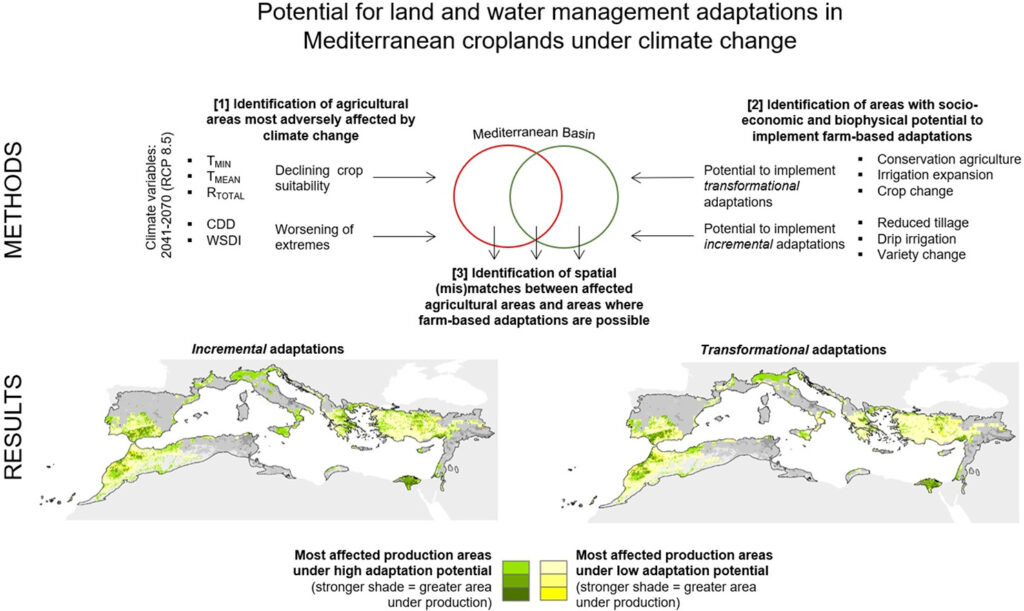The new research study explores the adaptation capacities for crop farmers to the impacts of the warming climate. The study is mapping the potential of soil- crop- and water-based adaptations to contrast drought and heat stress in farms across the Mediterranean Basin. Unfortunately, the regions subject to most climatic extremes are also those with lowest adaptation potential – for example poor regions with lower access to markets. In most regions, there is more than a 50% of mismatch between adaptation needs and adaptation potential. The study was lead by Cecilia Zagaria (Vrije Universiteit Amsterdam, The Netherlands) with the collaboration of the co-authors Catharina J.E.Schulp (Swiss Federal Research Institute WSL), Malek Žiga and Peter H.Verburg (Vrije Universiteit Amsterdam, The Netherlands)

Abstract:
CONTEXT
The Mediterranean Basin has been identified as a climate change “hotspot”, a region where increased warming and drying are expected to occur at rates faster than the global average. Increasing scientific attention has therefore been drawn to the repercussions of climate change for the Mediterranean’s diverse and valued agricultural sector. The extent to which these repercussions vary throughout the region, owing both to a non-uniform distribution of climatic hazards and to uneven adaptive capacities of farmers, remains however unquantified.
OBJECTIVE
We hereby provide a comprehensive spatial assessment of the potential to implement different farm-based land and water management adaptations across the Mediterranean’s croplands, and evaluate the extent to which different regions see a match or a mismatch between areas of adaptation need and areas of adaptation capacity.
METHODS
This approach made use of spatial multi-criteria analysis to evaluate the suitability of different farm adaptations, and relied on the Ecocrop climate suitability model and climate data on changing duration or frequency of extremes to identify areas of adaptation need under a high-end climate change scenario. The adaptations explored in this work span a range of sustainable approaches addressing different components of the farming system (soil-based, water-based, and crop-based adaptations). For each sub-system, we compared the potential to implement an adaptation representing an incremental change vs. one involving greater transformation.
RESULTS AND CONCLUSIONS
Results indicate a worsening of climatic conditions for all croplands in the region, and particularly within the Mediterranean extents of Egypt, Turkey, Greece, Spain, Morocco, Bosnia and Herzegovina, and Israel. In more than half of these countries, >60% of highly affected Mediterranean areas, on average, see no tangible potential to implement adaptations. Importantly, potentials for adaptation, and particularly of transformational adaptations having the greatest hypothesized capacity to buffer against the effects of climate change, are found to be lower within areas where the most adverse climate change hazards are forecast to occur.
SIGNIFICANCE
For regions found to be approaching so-called limits to adaptation, this research contributes to growing calls for consideration of more transformational options, alongside the opportunities and sacrifices these options entail. For regions where considerable (yet unrealized) adaptation capacity is found to match areas of adaptation need, this paper instead presents a basis for further investigation on how to bridge adaptation capacity and preparedness.
Cecilia Zagaria, Catharina J.E. Schulp, Žiga Malek, Peter H. Verburg, Potential for land and water management adaptations in Mediterranean croplands under climate change, Agricultural Systems, Volume 205, 2023, 103586, ISSN 0308-521X, https://doi.org/10.1016/j.agsy.2022.103586.
